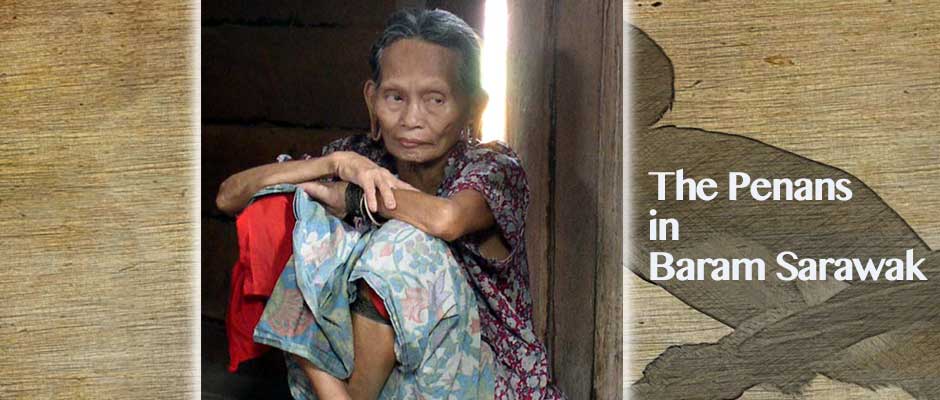At the level of the nation-state’s relationship with its indigenous minorities, this process is articulated via the language of “modernization,” in which the last of the rainforest foragers have to join the development fray. At the level of Sarawak state, this was manifest in the establishment of the Penan Volunteer Corps in late 1989 to assist fellow Penans through the transition. Since its inception, Volunteers have been trained as multi-taskers but masters of none, with some training in carpentry, adult and kindergarten teaching, hygiene, basic medical skills, and cultivation. In addition, they mediate between the Penan villages to which they have been posted and various government agencies under a special Penan Task Force led by a state minister.
In concrete economic terms, the new orientation means shifting from hunting and foraging to cultivation and the eventual abandonment of the Penan’s strategy of sustainable development of their forest resources through the practice of molong. Replacing autonomy, viable traditional knowledge, and a balanced person-environment matrix, however, is a new form of dependence on the tools of cultivation and the knowledge and skills necessary for new interactions with the environment. Sedentarization leads to the subjugation of Penan economic and political life to forces outside their control.
In the new environment, it is increasingly difficult to fall back on the forest for daily needs or tradeable products. Loggers have chased away the wild game, and much of the jungle produce, like rattan and gaharu, has been destroyed. Penans now have to travel far to find these. To cultivate the new staple, rice, they constantly have to negotiate with state agencies, through the Penan Volunteer Corps, for new equipment and tools. Even in their housing, the introduction of the permanent longhouse means dependence on the outside world for a supply of nails, planks, zinc, petrol (for generators and boat engines), and kerosene. The modernization package also includes toilet bowls, water pipes, medical facilities, clinics, and schools. But these are not always available when requested and have constantly to be negotiated. The burden always falls on the Penan Volunteer Corps, and failure or delay causes the Volunteer to lose credibility in the eyes of the community.
While there is a greater need for cash in their new economic life, Penans face the loss of commodities to sell that others want to buy. And because their environment is the jungle interior where access is through rivers or by foot, they have trouble marketing their products.
So Penans are forced to make deals. The pro-active seek to forge agreements with the logging companies—giving permission to the company to build a logging road through their land in exchange for the free supply of planks for their longhouse, petrol for their generator, and transport to market vegetables or other food at the logging camps. The companies do not alway fulfill their promises. And of course there are Penan groups who refuse to make such deals, especially after being disappointed with their first encounter with the loggers, who “came without knocking on our doors.”
Finally, the new environment ushers the Penan into a contestation between two sets of laws—the traditional notion of Penan stewardship (Brosius 1986) and the modern legal order laid out in the Land Code of 1958, which recognizes “cultivation” (the felling of trees and creation of cultivated land, temuda) before January 1958 as evidence of land ownership. At present, Penans have been allowed to settle and cultivate without resort to the Land Code through “goodwill” arrangements with other established, land-based, cultivating indigenous groups mediated by administrative officials. In some of these areas, disputes arise between the non-Penan claimants and the Penan newcomers. Penans, however, tend to argue their claims on the basis of stewardship—their earlier physical movements through land they have transversed for generations—not “cultivation” or the presence of temuda. In fact, they can even show ancestral burial grounds which they have marked as evidence of their claim to stewardship over such areas.
Modernization has created new questions for the majority of the Penans who have joined the way of mainstream society. Inevitably, the process has transformed how they interact with their environment. Their well-being is now more dependent on outsiders and authorities. Many of the solutions and answers lie outside their control, especially with the state and the logging companies. Most Penans have genuinely answered the government’s call of “development” to give up their nomadic ways. Now it is up to the state to follow through with political will and empowerment to realize the full potential of Penan development, on the basis of appropriate consultation and negotiation.
Zawawi Ibrahim
Zawawi Ibrahim is a social anthropologist who has conducted research on the Penans of Baram Sarawak under a Toyota Foundation Grant. He is editing a volume on the Penans in the context of contemporary social change and is currently Professor of Sociology and Deputy Dean in the Faculty of Social Sciences, Universiti Malaysia Sarawak (UNIMAS). He can be reached at: iwzawawi@fss.unimas.my
Kyoto Review of Southeast Asia. Issue 2 (October 2002). Disaster and Rehabilitation
References
Brosius, J. Peter. 1986. River, forest and mountain: The Penan Gang landscape. Sarawak Museum Journal 57.
Langub, Jayl. 1996. Penan response to change and development. In Borneo in Transition: People, Forests, Conservation, and Development, ed. Christine Padoch and Nancy Lee Peluso. Kuala Lumpur: Oxford University Press.

